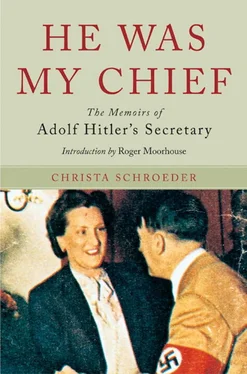Christa Schroeder - He Was My Chief - The Memoirs of Adolf Hitler's Secretary
Здесь есть возможность читать онлайн «Christa Schroeder - He Was My Chief - The Memoirs of Adolf Hitler's Secretary» весь текст электронной книги совершенно бесплатно (целиком полную версию без сокращений). В некоторых случаях можно слушать аудио, скачать через торрент в формате fb2 и присутствует краткое содержание. Город: Barnsley, Год выпуска: 2012, ISBN: 2012, Издательство: Frontline Books, Жанр: История, Биографии и Мемуары, на английском языке. Описание произведения, (предисловие) а так же отзывы посетителей доступны на портале библиотеки ЛибКат.
- Название:He Was My Chief: The Memoirs of Adolf Hitler's Secretary
- Автор:
- Издательство:Frontline Books
- Жанр:
- Год:2012
- Город:Barnsley
- ISBN:978-1-7830-3064-4
- Рейтинг книги:4 / 5. Голосов: 1
-
Избранное:Добавить в избранное
- Отзывы:
-
Ваша оценка:
- 80
- 1
- 2
- 3
- 4
- 5
He Was My Chief: The Memoirs of Adolf Hitler's Secretary: краткое содержание, описание и аннотация
Предлагаем к чтению аннотацию, описание, краткое содержание или предисловие (зависит от того, что написал сам автор книги «He Was My Chief: The Memoirs of Adolf Hitler's Secretary»). Если вы не нашли необходимую информацию о книге — напишите в комментариях, мы постараемся отыскать её.
He Was My Chief: The Memoirs of Adolf Hitler's Secretary — читать онлайн бесплатно полную книгу (весь текст) целиком
Ниже представлен текст книги, разбитый по страницам. Система сохранения места последней прочитанной страницы, позволяет с удобством читать онлайн бесплатно книгу «He Was My Chief: The Memoirs of Adolf Hitler's Secretary», без необходимости каждый раз заново искать на чём Вы остановились. Поставьте закладку, и сможете в любой момент перейти на страницу, на которой закончили чтение.
Интервал:
Закладка:
After completing the supplementary cure with Professor Zabel in July 1944 I resumed my duties at FHQ Wolfsschanze where the bunkers had been reinforced against air attack. The flat roofs had been camouflaged with grass and trees to prevent their being spotted by air reconnaissance. Upon my return Hitler was as warm to me as he had been in earlier times. Knowing that I was also persevering with the Bircher-Benner diet he asked me if I would be eating in the officers’ mess or alone. When I said ‘alone’ he invited me to dine with him in his bunker. On 19 July 1944, the day before the assassination attempt, he was not feeling quite well. He always had premonitions. He felt that an attempt on his life was being planned. He told me this and even said: ‘I note that there is something afoot’, and again: ’Nothing must happen to me, there is nobody who can carry on the business.’
The situation conferences at that time were being held in the social room in the guests’ barrack hut. It was a very hot summer with swarms of mosquitoes and biting midges in the swampy meadows. The sentries wore mosquito nets over their heads. Around midday on 20 July I heard an explosion. This often happened because landmines were laid off the paths and wild animals frequently set them off. This time it was different. People were shouting excitedly for doctors: ‘A bomb has gone off, probably in the guest hut!’ Suddenly the barriers were up everywhere. I was just thinking that today I would definitely not be dining with the boss when I heard: ‘Nothing has happened to the chief, but the hut has been blown up!’
Contrary to my expectations, towards 1500 that afternoon he summoned me. As I entered his bunker he rose with some effort and gave me his hand. He looked surprisingly fresh and spoke about the assassination attempt: ‘The heavy table leg diverted the explosion. The stenotyist sitting near me had both legs blown off. I had extraordinary luck! If the explosion had happened in the bunker and not in the wooden hut, nobody would have survived it. But haven’t I always anticipated that happening? I told you yesterday, don’t you remember?’
Hitler then asked if I had seen the conference room, it was wrecked beyond imagining. When I said I had not, since the area was cordoned off, he said I should at least see his tattered uniform. He had his manservant bring it to him and showed me the trousers, in strips and ribbons from top to bottom and only held together by the waistband. A square piece of cloth had been torn from the tunic. He was proud of these trophies and asked me to send them to Eva Braun at the Berghof with the instruction that they should be carefully preserved. Hitler then described how the attempt had affected his valets: ‘Linge was absolutely furious and Arndt stood there with tears in his eyes. [85] Wilhelm Arndt (b. 6.7.1913, d. 22.4.1945). 1944 appointed manservant in rank of SS-Hauptscharführer. He was tall and blue eyed, and Schroeder stated of him that he was Hitler’s favourite valet. Killed when a Ju 352 of the Führer-Staffel from Berlin-Staaken in which he was a passenger crashed at Börnersdorf.
Dr Morell was terribly shaken and emotional after the incident and Hitler had to calm him before the doctor could tend to Hitler’s injuries. Although Hitler suffered concussion, a ruptured eardrum and flaking of the skin, he refused to lay up in bed as the other officers had done and was kept going by Dr Morell’s injections, as I confirmed from him at lunch. A visit by the former Duce was listed for the afternoon, and I expected Hitler to postpone it, but in response to my enquiry he assured me: ‘Certainly I shall receive him, I have no choice, for imagine what lies they would tell the world about me if I did not!’
When we assembled with Hitler for afternoon tea we had already received news of Stauffenberg’s arrest. At first Hitler was infuriated that Stauffenberg had managed to make it as far as Berlin, but when he found out that this had led to the arrest of all the close conspirators he stated in satisfaction: ‘Now I am calm. It is the salvation of Germany. Now I finally have the swine who have been sabotaging my work over the years. I always told Schmundt but he is a Parsival and would not believe it. Now I have the proof: the whole general staff is infected.’
Hitler continued:
These criminals who wanted to rid themselves of me have no idea of what would happen to the German people. They do not know the plans of our enemies who intend to destroy Germany so that it can never rise again. And if they think that the Western Powers without Germany are strong enough to resist Bolshevism, then they are deceiving themselves. I will ensure that nobody will ever again be able to displace me. I am the only person who knows the danger, and the only person who can avert it.
A radio van was ordered from Königsberg and a transmitter unit installed in the FHQ tea-house. Shortly before midnight we went there with Hitler. The lightly wounded officers who had survived the attempt were also there: Jodl with bandaged head, Keitel with bandaged hands. Just after midnight on 21 July 1944 Hitler made a short speech to convince the German people that he had survived unscathed. It was thanks to Providence that the German people had been spared great misfortune.
In early September 1944 Hitler suffered severe stomach and intestinal problems. He put himself to bed but did not improve. Dr Morell diagnosed retention of bile caused by gall bladder spasms. Hitler lay apathetic for several days but then made a gradual return to work at the beginning of October 1944. The death of Wehrmacht chief adjutant Generalleutnant Schmundt made a deep impression on Hitler, for he had held weighty and portentous conversations with him. ‘We liquidated the class enemy on the Left’, Hitler said, ‘but unfortunately we forgot to do the same with the Right. That has been our great sin of omission.’ He went on: ‘One cannot fight a war with incapable generals, one should take a leaf out of Stalin’s book, he purged his army ruthlessly.’ Here he was talking more to himself and suddenly changed the subject as if he had said too much.
In September 1944 Himmler provided him with a report on the Resistance involving the military in 1939. Hitler did not like the officer caste. At the Berghof he once said:
After the war I shall hang my uniform on a peg, withdraw, and let somebody else take over the affairs of government. Then I will write my memoirs, surround myself with intelligent, clever people and refuse to receive another officer. They are all strawheads and simple-minded. My two senior-serving secretaries will stay with me and write for me. The younger ones will get married and leave, and when I am old the elder ones can fall in with my tempo.
Towards the end of 1944 the stay at FHQ Wolfsschanze became increasingly anxious. Every day enemy aircraft overflew the HQ. Hitler expected a surprise air raid at any moment and warned people to use the air raid bunkers. He did not want to hear talk of transferring the FHQ to Berlin although he was being urged to do so from all sides. He explained: ‘It is my duty to remain here. It keeps the people calm. My soldiers will also never permit the frontline to be pulled back to the Führer’s HQ. And so long as they know that I am holding out here, they will be all the more determined in their struggle to stabilise the Front.’ All the same the HQ was removed to Berlin at the end of November 1944 as the Front edged back ever closer. [86] Hitler left FHQ Wolfsschanze on his special train on 20 November 1944. The enemy remained unaware of the location of FHQ Wolfsschanze throughout its period of occupation.
The preparations for the Ardennes offensive, which Hitler promised would bring the turn in our fortunes in the West, were begun at FHQ Wolfsschanze. Towards the end of 1944 he waited impatiently for the right moment to give the order to strike. His intuition played no decisive role in setting X-Day, however: this was left to the meteorologists. He consulted them daily. The expert who predicted a period of fog during December 1944, which favoured the concentration of troops before the Offensive began, received a gold watch in gratitude for his correct forecast.
Читать дальшеИнтервал:
Закладка:
Похожие книги на «He Was My Chief: The Memoirs of Adolf Hitler's Secretary»
Представляем Вашему вниманию похожие книги на «He Was My Chief: The Memoirs of Adolf Hitler's Secretary» списком для выбора. Мы отобрали схожую по названию и смыслу литературу в надежде предоставить читателям больше вариантов отыскать новые, интересные, ещё непрочитанные произведения.
Обсуждение, отзывы о книге «He Was My Chief: The Memoirs of Adolf Hitler's Secretary» и просто собственные мнения читателей. Оставьте ваши комментарии, напишите, что Вы думаете о произведении, его смысле или главных героях. Укажите что конкретно понравилось, а что нет, и почему Вы так считаете.












